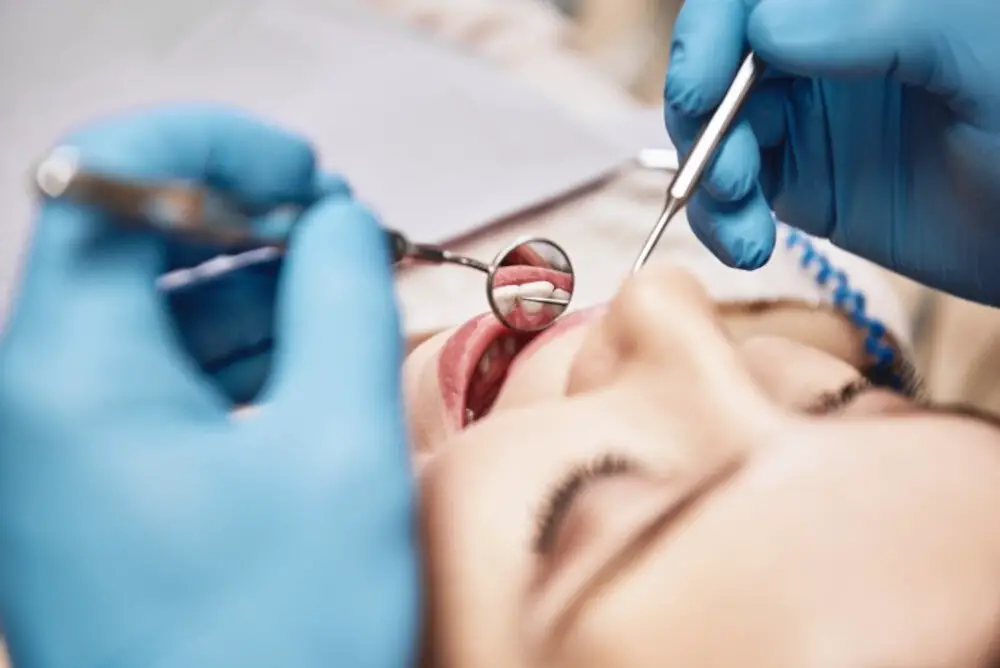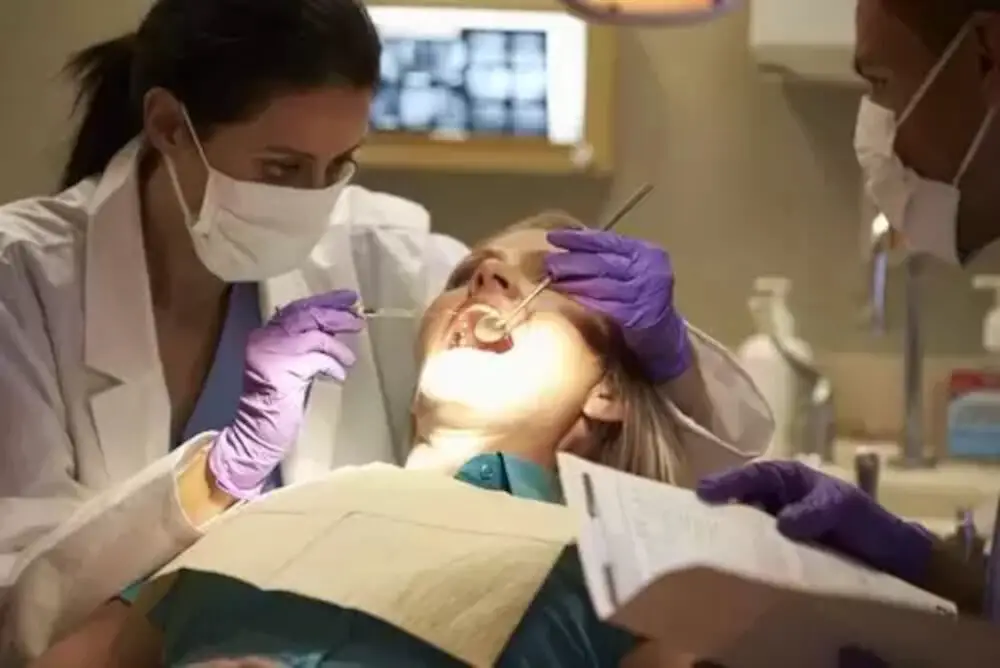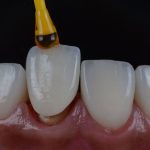Prevent Gum Overgrowth: Tips to Stop Gums from Growing Over Teeth

Gum overgrowth, also known as gingival hyperplasia, is a dental condition where the gums grow abnormally and cover the teeth. It is a common problem that affects people of all ages, and it can be caused by various factors such as poor oral hygiene, certain medications, hormonal changes, and genetic predisposition. Gum overgrowth can cause discomfort, pain, and difficulty in cleaning the teeth, which can lead to tooth decay and other oral health issues. Fortunately, there are ways to prevent gum overgrowth from occurring or worsening. By adopting healthy oral habits and seeking professional dental care, you can keep your gums healthy and prevent them from growing over your teeth. In this article, we will share some tips and strategies that you can use to prevent gum overgrowth and maintain good oral health. From proper brushing and flossing techniques to the use of certain medications and surgical procedures, we will explore different approaches to managing gum overgrowth and keeping your smile healthy and beautiful.
Gum overgrowth, also known as gingival hyperplasia, is a condition where the gum tissues surrounding the teeth grow excessively and extend over the teeth. This can result in an unsightly appearance, discomfort, and difficulty in maintaining oral hygiene. The causes of gum overgrowth can vary from genetic factors, poor oral hygiene, hormonal changes, certain medications, and systemic illnesses. It is essential to identify the underlying cause of gum overgrowth to determine the appropriate treatment plan, which may include scaling and root planing, medication adjustment, or surgical intervention. Regular dental check-ups and maintaining good oral hygiene practices may also help prevent gum overgrowth.
Maintain Good Oral Hygiene

Maintaining good oral hygiene is crucial for preventing gum overgrowth and keeping your teeth healthy. Brushing your teeth twice a day, flossing daily, and using mouthwash can help remove plaque and bacteria that can lead to gum disease. When brushing your teeth, it’s important to use a fluoride toothpaste and a soft-bristled toothbrush to prevent gum irritation. Make sure to brush all surfaces of your teeth, including the fronts, backs, and chewing surfaces, as well as your tongue and the roof of your mouth. Flossing is equally important as it helps to remove plaque and food particles from between your teeth and under the gum line. Finally, using mouthwash can help kill bacteria and freshen your breath. Incorporating these habits into your daily routine can help prevent gum overgrowth and other dental problems. In addition to regular oral hygiene practices, it’s important to visit your dentist regularly for checkups and cleanings. Your dentist can help identify early signs of gum disease, such as swollen or bleeding gums, and provide treatment to prevent gum overgrowth and other complications. They may also recommend additional treatments, such as scaling and root planing, to remove plaque and bacteria from below the gum line. Your dentist can also provide advice on how to maintain good oral hygiene and prevent gum overgrowth, such as recommending certain toothbrushes or flossing techniques. Taking care of your teeth and gums is an important part of maintaining your overall health, so make sure to prioritize your dental hygiene.
Brushing and flossing are the two most important components of oral hygiene that can help prevent gum overgrowth. When brushing, it is important to use a soft-bristled toothbrush and gentle circular motions, focusing on each tooth individually. Flossing should be done daily to remove plaque and food particles from between teeth where a toothbrush cannot reach. It is best to use waxed floss to avoid getting it caught in between teeth and causing irritation. Additionally, using an antiseptic mouthwash can help kill any remaining bacteria and promote healthy gum tissue. By following these techniques, individuals can maintain proper oral hygiene and prevent gum overgrowth.
Regular dental checkups are crucial in maintaining good oral health. Gum overgrowth is a common problem that can lead to a host of dental issues if left untreated. Regular checkups allow dentists to identify gum overgrowth early and take the necessary steps to prevent it from getting worse. In addition, dentists can provide patients with tips and advice on how to maintain healthy gums and prevent gum overgrowth from occurring in the first place. By attending regular dental checkups, individuals can avoid more serious dental problems down the line and enjoy a lifetime of healthy teeth and gums.
Avoid Harsh Toothbrushes and Toothpaste

Using a harsh toothbrush or toothpaste can do more harm than good to your teeth and gums. The bristles of a toothbrush that are too hard can wear down the enamel of your teeth, which can lead to sensitive teeth and even pain. Harsh toothpaste can also be abrasive and cause damage to your teeth and gums. Moreover, it can cause gum overgrowth, leading to a host of dental problems. Therefore, it is essential to use a soft-bristled toothbrush and a gentle toothpaste that will not damage your teeth and gums. When it comes to preventing gum overgrowth, using a soft-bristled toothbrush and a gentle toothpaste is vital. Soft-bristled toothbrushes are much gentler on the teeth and gums, helping to prevent damage to the enamel and gum tissue. Additionally, a gentle toothpaste will not cause irritation to your gums, allowing them to remain healthy and free from overgrowth. So, make sure to choose a toothbrush and toothpaste that suit your dental needs and are gentle on your teeth and gums. By doing so, you can help prevent gum overgrowth and maintain good oral health.
Using harsh toothbrushes and toothpaste can lead to gum overgrowth due to the abrasive nature of these products. Toothbrushes with hard bristles can cause damage to the delicate gum tissue, leading to inflammation and irritation. This, in turn, can trigger an overgrowth of gum tissue, as the body attempts to protect the affected area. Similarly, toothpaste containing harsh chemicals and abrasives can also contribute to gum overgrowth by damaging the gum tissue and causing inflammation. It is important to choose a soft-bristled toothbrush and a gentle toothpaste to avoid causing damage to the gums and prevent gum overgrowth.
If you are experiencing gum overgrowth, it is important to consider alternative products to use for your oral care routine. One option is to switch to a soft-bristled toothbrush to avoid further irritation to your gums. Additionally, you may want to try using an electric toothbrush, as it can provide a more thorough cleaning without causing excess pressure on your gums. Another alternative product to consider is a water flosser, which can effectively clean between teeth and below the gumline without causing trauma to the gums. Finally, using an antibacterial mouthwash can help to reduce inflammation and prevent the growth of harmful bacteria that can contribute to gum overgrowth. By incorporating these alternative products into your oral care routine, you can help to prevent gum overgrowth and maintain healthy gums and teeth.
Watch Your Medication

Gum overgrowth, also known as gingival hyperplasia, can be caused by certain medications. These medications often include calcium channel blockers, immunosuppressants, and anti-seizure drugs. If you are taking any of these medications and notice gum overgrowth, it is important to speak with your healthcare provider about alternative medications or adjusting your dosage. Additionally, it is important to maintain good oral hygiene habits such as brushing and flossing regularly to prevent further gum overgrowth. Even if you are not taking medication that is known to cause gum overgrowth, it is still important to monitor your medication use. Certain antibiotics can also cause gum overgrowth, so it is important to discuss any potential side effects with your healthcare provider before starting a new medication. Additionally, some over-the-counter medications such as mouthwashes containing alcohol can irritate the gums and lead to overgrowth. By being aware of the potential side effects of your medications and maintaining good oral hygiene habits, you can help prevent gum overgrowth and maintain a healthy smile.
Gum overgrowth, also known as gingival hyperplasia, is a condition where the gums grow excessively and cover the teeth. While poor oral hygiene and genetic factors play a role in this condition, certain medications can also cause gum overgrowth. The list of medications that can cause this includes immunosuppressants like cyclosporine and tacrolimus, anticonvulsants like phenytoin and valproate, and calcium channel blockers like nifedipine and verapamil. It is important to inform your dentist or healthcare provider if you are taking any of these medications to prevent and manage gum overgrowth. Regular dental check-ups, proper oral hygiene, and medication management are necessary to prevent and treat gum overgrowth.
If you are experiencing gum overgrowth due to certain medications, there are some tips to help manage this issue. First, make sure to maintain good oral hygiene habits, including brushing twice a day and flossing regularly. Second, talk to your dentist or doctor about the possibility of switching to a different medication that may not cause gum overgrowth. Third, consider using a mouthwash that contains an antimicrobial agent to help reduce inflammation in the gums. Finally, make sure to attend regular dental check-ups to monitor the condition of your gums and receive any necessary treatment. By following these tips, you can manage medication-related gum overgrowth and maintain healthy gums and teeth.
Consider Gum Surgery

Gum surgery might sound like a daunting and painful procedure, but it can be a necessary solution for those suffering from gum overgrowth. This condition occurs when the gum tissue grows too much and covers the teeth, leading to discomfort and difficulty in maintaining oral hygiene. Gum surgery can remove the excess tissue and restore a healthy gum line, preventing further complications such as gum disease and tooth loss. It is important to consult with a dental professional to determine if gum surgery is the right option for your specific case. There are several types of gum surgery, including gingivectomy, gingivoplasty, and periodontal flap surgery. Each procedure targets different aspects of gum overgrowth and can be tailored to fit the patient’s needs. Although the recovery process may vary, most patients can expect to return to their normal activities within a few days to a week. In addition to undergoing gum surgery, it is important to maintain good oral hygiene habits and schedule regular dental checkups to prevent gum overgrowth from recurring. Overall, gum surgery can be a beneficial and effective solution for those struggling with gum overgrowth, improving oral health and overall quality of life.
Gum surgery may be necessary in cases where the gums have overgrown, causing discomfort, pain, or difficulty in cleaning the teeth. This overgrowth can occur due to several reasons, including poor oral hygiene, certain medications, or hormonal changes. In some cases, gum surgery may also be required to treat gum disease or to correct a gum recession. The procedure involves removing the excess tissue from the gums and reshaping them to fit snugly around the teeth. The surgery can help improve oral health and prevent further complications, such as tooth decay or tooth loss. However, it is important to maintain good oral hygiene habits to prevent gum overgrowth from occurring again in the future.
There are several types of gum surgery available for treating gum overgrowth. Gingivectomy is a common procedure that involves removing excess gum tissue. This surgery is often used in cases of severe gum overgrowth or when the gums cover too much of the teeth. Another type of gum surgery is gingivoplasty, which reshapes and recontours the gums to create a more aesthetically pleasing appearance. For patients with receding gums, a gum graft may be necessary to restore the gum line. In this procedure, tissue is taken from another part of the mouth and grafted onto the affected area. Finally, flap surgery is another option for treating gum overgrowth. This involves lifting the gums to clean and remove any damaged tissue, then reattaching the gums to the teeth.
Preventing gum overgrowth is essential for maintaining healthy teeth and gums. First and foremost, maintaining good dental hygiene by brushing and flossing regularly can help prevent gum overgrowth. Additionally, avoiding tobacco use, which can irritate the gums and lead to overgrowth, is highly recommended. Another helpful tip is to avoid certain medications, such as those used for high blood pressure or seizures, that can cause gum overgrowth as a side effect. If you are experiencing gum overgrowth, it is important to consult with a dental professional to determine the underlying cause and develop an appropriate treatment plan. With these tips in mind, you can work to prevent gum overgrowth and maintain optimal oral health.
If you are experiencing gum overgrowth, it is crucial to seek professional dental advice immediately. Ignoring this condition can lead to serious dental problems such as tooth decay, gum infections, and even tooth loss. A dental professional can diagnose the cause of the overgrowth and suggest the best treatment plan. They may recommend a deep cleaning procedure to remove plaque and tartar buildup, prescribe antibiotics to treat an infection, or even refer you to a periodontist for more advanced treatment options. Seeking professional dental advice can help prevent further damage to your oral health and ensure that your gums stay healthy and free from overgrowth.
Conclusion

In conclusion, preventing gum overgrowth is essential for maintaining good oral health and preventing discomfort and potential tooth loss. By following some simple tips such as practicing good oral hygiene, avoiding tobacco products, and seeking professional dental care, individuals can stop gums from growing over teeth. It is also important to address any underlying medical conditions or medications that may contribute to gum overgrowth. By taking a proactive approach to dental health, individuals can enjoy a healthy, beautiful smile for years to come. Remember, prevention is key when it comes to gum overgrowth, so don’t delay in taking action to protect your oral health.







